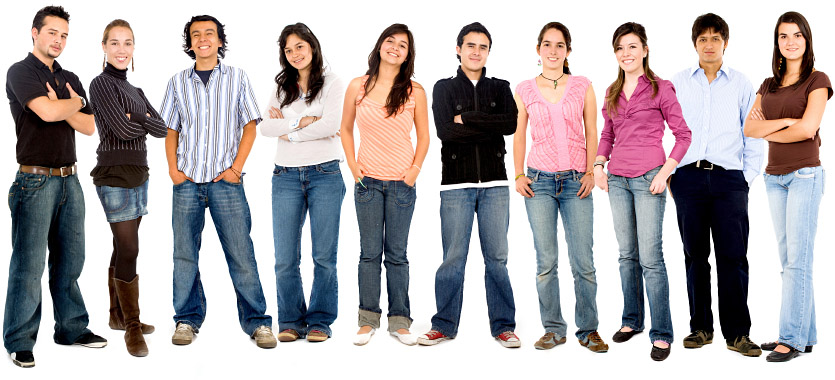 BY VIVIAN MCINERNY | OB BLOGGER
BY VIVIAN MCINERNY | OB BLOGGER
Young people believe business has the most potential — more than government and more than nonprofits — to make the world a better place.
 BY VIVIAN MCINERNY | OB BLOGGER
BY VIVIAN MCINERNY | OB BLOGGER
The future of business looks good. Not necessarily fat-profit-and-big-bonus good but clear-conscience-and-shining-halo good.
A report from Quinn Thomas and DHM Research suggests young people believe business has the most potential — more than government and more than nonprofits — to make the world a better place.
That’s an idea that should make the C-suite sit up a little straighter.
The recently released Insights report, considers the impact so-called Millennials (born 1980-2000) will have on the economy, politics and community involvement in the Pacific Northwest.
That a generation coming of age during Occupy Wall Street, hedge fund scandals and a wage gap frequently called “feudal” retains faith in the power of business to do good surprises me. But it’s a delightful Mother’s-Day-breakfast-in-bed kind of surprise. It seems those Millennials may actually want to get in there and change things up.
Obviously, you can’t pigeonhole a single person, let alone an entire generation. The same demographic that embraces slow foods, sells DIY crafts on Etsy and is often summarized as over-educated and under-employed includes people who eat fast food, shop garage sales, and never had a shot at higher ed. Millennials keep up with the Kardashians in mind-numbing televised marathons and crowd source to fund charitable causes. They indulge in inane tweets, blog posts, viral gossip and seek something more meaningful.
Theirs is not a world of either/or but rather and.
Researchers asked Millennials to rank what mattered most to them in the workplace. For 24 percent, contributing to society’s benefit topped the list. (In comparison, Baby Boomers replied with a relative “meh” at 15 percent. Any business that wants to recruit the best minds of Generation Mill better prepare to deliver the good.
Fortunately, this new hot commodity is something every business is capable of producing.
If the hippie generation tried to turn its back on consumerism, the Millennials are more pragmatic. Or maybe more wholly integrated is a better term. They seem less interested in dividing their lives into neat little categories — here’s my work, here’s my family, here’s my do-gooder stuff — and instead aim for each aspect of their lives to complement the others. They are interested in what’s been dubbed Collaborative Consumption. Examples include co-work spaces such as ADX, Collective Agency, The Hive, NedSpace and TENpod in Portland, where desks, meeting rooms and amenities from wi-fi and fridges are shared. Or consider Modern Domestic in Northeast Portland. It’s a fabric store that offers sewing classes and rents sewing studio space for an hourly or monthly fee, granting access to cutting tables, tools, and sewing machines. Maybe the Millennials who grew up with organized playdates and co-op indoor parks are adapting those ideals to work.
See, sanitizing shared plastic toys in church basements paid off.
Even bigger than collaborative consumption is the move toward conscientious consumption. Millennials put their money where their hearts are. Sure, the big box stores offer bargain prices but Little Boxes and indie retailers draw hordes of young shoppers. Buying a hat knit by a local artist isn’t only about looking hipper-than-thou. It’s about acknowledging a moral responsibility to money-dropping. They’ve seen how massive corporations often behave like mobs and prefer to support small businesses where responsibility is more personal.
Conscientious consuming is clearly evident in the slow food movement. Remember how PETA tried to shame people into vegetarianism, accosting strangers on the street with graphic images of the gritty meat industry? The Mills grew up with all that information at their fingertips. If they choose to eat meat they want to know how the animal was raised, not in a Colin-the-Portlandia-Chicken way but because whether an animal had a decent life before it was butchered matters to them.
Changing the world is hard. It’s also inevitable in a Butterfly Effect sort of way.
The Millennials seem more keenly aware of their flapping wings.
Maybe in the old days business could atone for its sins by setting aside money to do good. Sure, our substandard factory in a developing nation burned to the ground killing scores of innocent workers. But look over here! We support the arts! That’s not going to fly in the future. The Millennials are more holistic. They expect the process of doing businesses to be good in and of itself. (See Oregon Business story on The Fourth Sector.)
Millennials often get slammed for being self-absorbed. Supposedly, due to a self-esteem building experiment gone awry, they think any and every little thing they do is wonderful. As the mother of two (unquestionably wonderful) Mills, I’d like to speak in their defense: The kids are all right. Take those confidence boosting trophies they were awarded. Please. I loathed the tchotches that once cluttered our house. But give the kids some credit. They soon came to recognize those awards for what they were and no longer needed — or received — them. What’s important is that when they saw younger kids proudly display their own praise-all awards, they didn’t ridicule the innocents their gullibility but showed them the same kindness that had been shown them when they needed it. They played it forward.
That makes them winners in the bigger game.
Hold on a minute, I need to make some room on the trophy shelf of life.
Vivian McInerny is a writer in Portland.

 BY VIVIAN MCINERNY | OB BLOGGER
BY VIVIAN MCINERNY | OB BLOGGER

